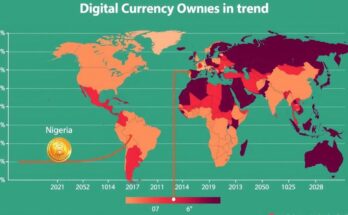The Democratic Republic of Congo is intensifying efforts to regulate companies sourcing minerals from its conflict-affected eastern regions, targeting smuggling operations that contribute to violence. The government has raised concerns with firms such as Apple Inc., linking their mineral purchases to human rights abuses. With over six million displaced persons in the country, these developments come against a backdrop of ongoing armed conflict and international scrutiny regarding regional stability.
The Democratic Republic of Congo (DRC) is taking decisive measures to regulate companies that procure minerals from its conflict-stricken eastern regions. This initiative aims to tackle the rampant smuggling that exacerbates one of the gravest humanitarian crises globally. Recently, the Congolese government cautioned Apple Inc. regarding its purchases of metals such as tin, tantalum, and gold, which may contribute to violence and are reportedly smuggled through Rwanda. Foreign Minister Therese Kayikwamba Wagner indicated that investigations are underway for additional companies, without revealing their identities. In an interview in New York, Minister Kayikwamba stated, “We are also taking a step back and looking at the bigger picture of what this means in terms of supply chains, what this means in terms of companies that may be liable for contributing to destabilizing an entire region. There’s legal action that has been explored, but I wouldn’t want to divulge much more.” The eastern regions of Congo are rich in minerals, which have been a significant factor in ongoing conflicts that have persisted for nearly thirty years, beginning with the aftermath of the Rwandan genocide. Tantalum, a key component in portable electronics, is primarily sourced from the DRC. According to Minister Kayikwamba, the smuggling of these minerals costs the nation billions of dollars annually. The recent seizure of the Rubaya tantalum mine by the M23 rebel group and claims of Rwandan military support to this group have heightened tensions. While Rwanda denies such allegations, the UN experts have classified minerals from Rubaya as “ineligible for trade” under its due diligence guidelines due to their violent associations. Apple has asserted that it conducts rigorous due diligence on its supply chain and finds no links to conflict in Congo. Currently, more than six million people are recorded as displaced in the DRC. This instability complicates the government’s efforts to manage a significant mpox outbreak in the eastern regions. Peace negotiations with Rwanda are reportedly showing slow progress, mediated by Angola with backing from the United States. Minister Kayikwamba remarked, “The conflict has been going on for 30 years, so it’s also about learning lessons from the past and making sure we don’t repeat them. I do not believe in negotiating to have a quick agreement.” The DRC is also advocating for sanctions against Rwandan officials implicated in the conflict, emphasizing that such measures should target decision-makers rather than the Rwandan populace. The M23 claims its motivations are to defend the rights of Tutsis and other Rwandan language speakers in the DRC. The United States and the European Union have already placed sanctions on certain Rwandan and Congolese officers for their alleged roles in atrocities committed during the conflict.
The Democratic Republic of Congo has long struggled with armed conflicts fueled by its vast mineral resources, particularly in its eastern regions, which are rich in tantalum, tin, and gold. These resources have drawn various militant groups and led to extensive smuggling networks that undermine regional stability and contribute to humanitarian crises. The recent actions by the DRC government to address the sourcing of conflict minerals reflect an effort to hold companies accountable and reduce the negative impact of illegal mining on the population. The relationship between the DRC and Rwanda has been fraught with tension, particularly related to allegations of Rwandan military support for Congolese rebel groups, further complicating efforts for peace in the region. The international community, including the United States and European Union, continues to monitor and sanction individuals implicated in these ongoing conflicts as they strive to promote stability in the region.
In conclusion, the Democratic Republic of Congo’s initiative to regulate mineral sourcing is an effort to combat the illicit trade that fuels violence and humanitarian crises in the eastern regions. By focusing on holding companies accountable and seeking justice through potential legal actions, the DRC aims to stabilize its economy and protect its citizens. The ongoing conflict, influenced by external factors and historical grievances, requires careful negotiation and international support, emphasizing the importance of addressing the root causes of violence while seeking a long-term resolution to the crisis.
Original Source: www.bnnbloomberg.ca




